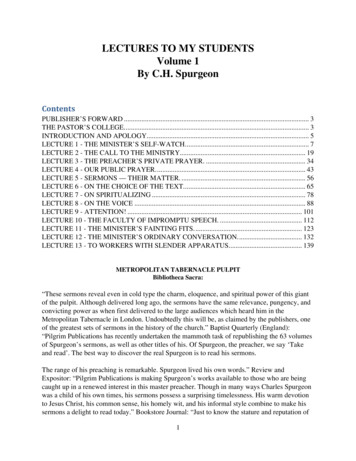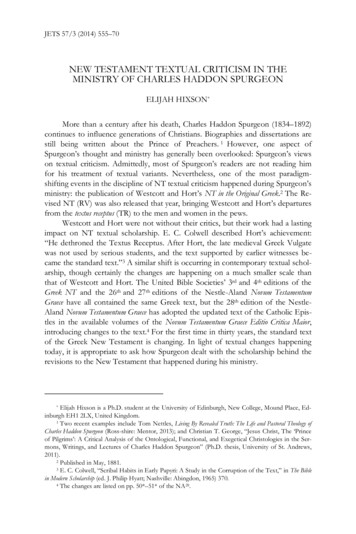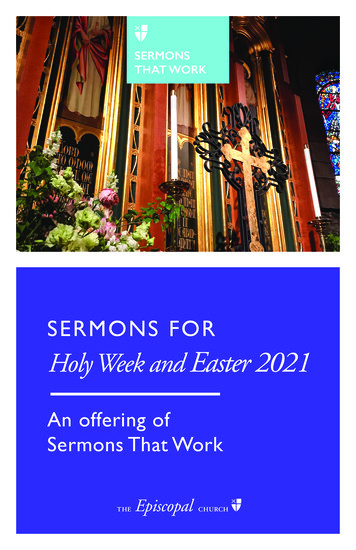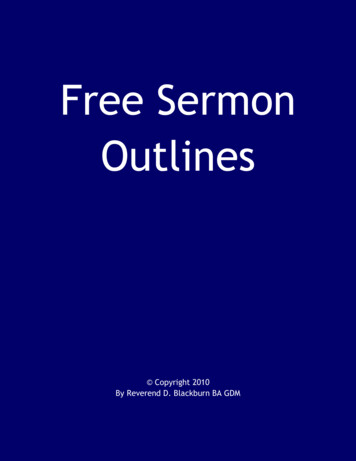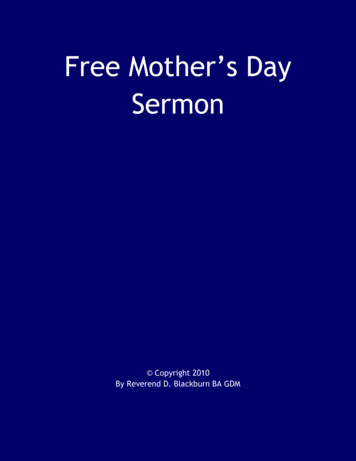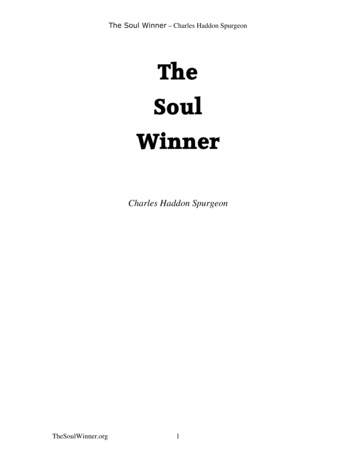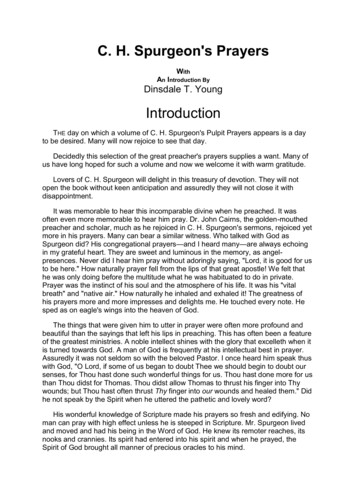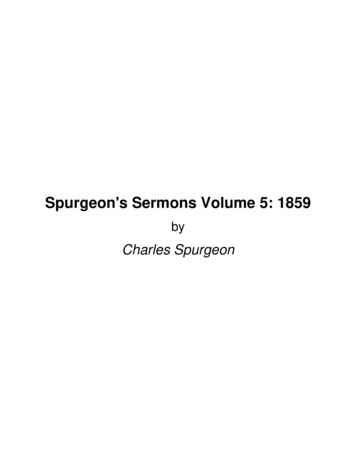
Transcription
Spurgeon's Sermons Volume 5: 1859byCharles Spurgeon
About Spurgeon's Sermons Volume 5: 1859 by Charles SpurgeonTitle:URL:Author(s):Publisher:Date Created:CCEL Subjects:LC Call no:LC Subjects:Spurgeon's Sermons Volume 5: mlSpurgeon, Charles Haddon (1834-1892)Grand Rapids, MI: Christian Classics Ethereal Library2002-08-27All; Sermons;BV42Practical theologyWorship (Public and Private) Including the church year, Christiansymbols, liturgy, prayer, hymnologyTimes and Seasons. The church year
Spurgeon's Sermons Volume 5: 1859Charles SpurgeonTable of ContentsAbout This Book. . . . . . . . . . . . . . . . . . . . . . . . . . . .Sermon 220. God's Barriers Against Man's Sin. . . . . . . .Sermon 225. Satan's Banquet. . . . . . . . . . . . . . . . . . .Sermon 226. The Feast of the Lord. . . . . . . . . . . . . . . .Sermon 227. Compel Them to Come In. . . . . . . . . . . . .Sermon 228. The Blood. . . . . . . . . . . . . . . . . . . . . . .Sermon 229. Love. . . . . . . . . . . . . . . . . . . . . . . . . . .Sermon 230. The Vanguard and Rereward of the Church.Sermon 231. Faith in Perfection. . . . . . . . . . . . . . . . . .Sermon 232. Perfection in Faith. . . . . . . . . . . . . . . . . .Sermon 233. Free Grace. . . . . . . . . . . . . . . . . . . . . .Sermon 234. Corn in Egypt. . . . . . . . . . . . . . . . . . . . .Sermon 235. The Fainting Warrior. . . . . . . . . . . . . . . .Sermon 236. The Shameful Sufferer. . . . . . . . . . . . . . .Sermon 237. Hypocrisy. . . . . . . . . . . . . . . . . . . . . . .Sermon 238. Reform. . . . . . . . . . . . . . . . . . . . . . . . .Sermon 239. Jacob and Esau. . . . . . . . . . . . . . . . . . .Sermon 240. Prayer Answered, Love Nourished. . . . . . .Sermon 241. Predestination and Calling. . . . . . . . . . . .Sermon 242. Christ Precious to Believers. . . . . . . . . . . .Sermon 243. Weak Hands and Feeble Knees. . . . . . . . .Sermon 244. The Bed and Its Covering. . . . . . . . . . . . .Sermon 245. The Way to God. . . . . . . . . . . . . . . . . . .Sermon 246. Mr. Fearing Comforted. . . . . . . . . . . . . . .Sermon 247. The Best of Masters. . . . . . . . . . . . . . . . .Sermon 248. Little Sins. . . . . . . . . . . . . . . . . . . . . . .Sermon 249. A Vision of the Latter-Day Glories. . . . . . . .Sermon 250. War! War! War!. . . . . . . . . . . . . . . . . . . .Sermon 251. War! War! War!. . . . . . . . . . . . . . . . . . . .Sermon 252. Holy Violence. . . . . . . . . . . . . . . . . . . . .Sermon 253. A Psalm of Remembrance. . . . . . . . . . . .Sermon 254. The Wounds of Jesus. . . . . . . . . . . . . . .Sermon 255. Justice Satisfied. . . . . . . . . . . . . . . . . . .Sermon 256. The Believer's Challenge. . . . . . . . . . . . .Sermon 257. The Scales of Judgment. . . . . . . . . . . . . .iii.p. iip. 1p. 11p. 21p. 29p. 38p. 47p. 55p. 64p. 74p. 81p. 91p. 100p. 109p. 119p. 128p. 138p. 148p. 157p. 166p. 175p. 184p. 193p. 202p. 211p. 220p. 228p. 236p. 246p. 255p. 264p. 273p. 281p. 290p. 298
Spurgeon's Sermons Volume 5: 1859Charles SpurgeonSermon 258. His Name—the Mighty God. . . . . . . . . . . . . . . .Sermon 259. A Home Mission Sermon. . . . . . . . . . . . . . . . .Sermon 260. An Earnest Invitation. . . . . . . . . . . . . . . . . . . .Sermon 261. The Call of Abraham. . . . . . . . . . . . . . . . . . . .Sermon 262. Distinguishing Grace. . . . . . . . . . . . . . . . . . . .Sermon 263. The Story of God's Mighty Acts. . . . . . . . . . . . .Sermon 264. How Saints May Help the Devil. . . . . . . . . . . . .Sermon 265. The Meek and Lowly One. . . . . . . . . . . . . . . . .Sermon 266. The Blind Beggar. . . . . . . . . . . . . . . . . . . . . .Sermon 267. The Tabernacle of the Most High. . . . . . . . . . . .Sermon 268. The Ceremony of Laying the First Stone ofTabernacle. . . . . . . . . . . . . . . . . . . . . . . . . . . . . . . . . . .Sermon 271. Faith Illustrated. . . . . . . . . . . . . . . . . . . . . . . .Sermon 272. Limiting God. . . . . . . . . . . . . . . . . . . . . . . . . .Sermon 273. Christ Triumphant. . . . . . . . . . . . . . . . . . . . . .Sermon 274. Paul's Desire to Depart. . . . . . . . . . . . . . . . . . .Sermon 275. Who Can Tell?. . . . . . . . . . . . . . . . . . . . . . . .Sermon 276. A Divided Heart. . . . . . . . . . . . . . . . . . . . . . .Sermon 277. The Blood of the Everlasting Covenant. . . . . . . .Sermon 278. Grieving the Holy Spirit. . . . . . . . . . . . . . . . . . .Sermon 279. Come and Welcome. . . . . . . . . . . . . . . . . . . .Sermon 280. The Chaff Driven Away. . . . . . . . . . . . . . . . . . .Sermon 281. The Saviour's Many Crowns. . . . . . . . . . . . . . .Sermon 282. Christ's Estimate of His People. . . . . . . . . . . . .Sermon 283. The Sweet Uses of Adversity. . . . . . . . . . . . . . .Sermon 284. One Antidote for Many Ills. . . . . . . . . . . . . . . . .Sermon 285. Man's Ruin and God's Remedy. . . . . . . . . . . . .Indexes. . . . . . . . . . . . . . . . . . . . . . . . . . . . . . . . . . . . . .Index of Scripture References. . . . . . . . . . . . . . . . . . . . . .Index of Scripture Commentary. . . . . . . . . . . . . . . . . . . . .iv.the. . . p. 308. . . p. 316. . . p. 325. . . p. 335. . . p. 342. . . p. 350. . . p. 360. . . p. 370. . . p. 380. . . p. 388New. . . p. 396. . . p. 426. . . p. 435. . . p. 444. . . p. 453. . . p. 463. . . p. 473. . . p. 482. . . p. 491. . . p. 500. . . p. 510. . . p. 520. . . p. 528. . . p. 538. . . p. 546. . . p. 556. . . p. 565. . . p. 565. . . p. 566
Spurgeon's Sermons (V5)Charles SpurgeonGod’s Barriers Against Man’s SinA Sermon(No. 220)Delivered on Sabbath Morning, November 16th, 1856, by theREV. C.H. SPURGEONAt New Park Street Chapel, Southwark.BELOVED FRIENDS AND KINDRED IN CHRIST,The days seem like weeks and the weeks seem like months since I went up to the house of theLord. My heart and my flesh are crying out for the assembly of the saints. Oh how I long to hearonce more the solemn shout of the festal throng who with the voice of joy and praise keep holyday!I am slowly rallying. My great struggle now is with weakness. I feel as if my frail bark hadweathered a heavy storm which has made every timber creak. Do not attribute this illness to myhaving laboured too hard for my Master. For his dear sake, I would that I may yet be able to labourmore. Such toils as might be hardly noticed in the ramp for the service of one’s country, wouldexcite astonishment in the church for the service of our God.And now, I entreat you for love’s sake to continue in prayer for me. When ye find access toGod, remember me. Mind it is not by the words of your mouth, nor yet by the cravings of yourheart, but it is by the precious blood of Christ ye must draw nigh to God. And when ye find hissweet presence and are bedewed with his holy anointing, then pour out your souls before him, andmake mention of me in your supplications.Yours to love and serve in the Gospel,C. H. SPURGEON.Clapham, Tuesday Evening, 26th October, 1858.“Fear ye not me? saith the Lord; will ye not tremble at my presence, which have placed thesand for the bound of the sea by a perpetual decree, that it cannot pass it: and though the wavesthereof toss themselves, yet can they not prevail; though they roar, yet can they not pass over it?But this people hath a revolting and a rebellious heart; they are revolted and gone.”—Jeremiah5:22-23.THE MAJESTY OF God, as displayed in creation and providence, ought to stir up our heartsin adoring wonder and melt them down in willing obedience to his commands. The Almighty powerof Jehovah, so clearly manifest in the works if his hands, should constrain us, his creatures, to fearhis name and prostrate ourselves in humble reverence before his throne. When we know that thesea, however tempestuous, is entirely submissive to the behests of God; that when he saith, “Hithertoshalt thou come, but no further,” it dares not encroach—“the pride of its waves is stayed.” Whenwe know that God bridles the tempest, though “nature rocks beneath his tread,” and curbs theboisterous storm—he ought to be feared—verily, he is a God before whom it is no dishonour forus to bow ourselves in the very dust. The contemplation of the marvellous works which he dothupon “the great and wide sea,” where he tosseth the waves to and fro, and yet keepeth them in theirordained courses, should draw forth our devoutest emotions, and I could almost say, inspire us withhomage. Great art thou, O Lord God; greatly art thou to be praised; let the world which thou hast
Spurgeon's Sermons (V5)Charles Spurgeonmade, and all that therein is, declare thy glory! I can scarcely conceive a heart so callous that itfeels no awe, or a human mind so dull and destitute of understanding, as fairly to view the tokensof God’s omnipotent power, and then turn aside without some sense of the fitness of obedience.One might think the impression would be spontaneous in every breast, and if not, only let reasondo her office, and by slower process every mind should yet be convinced. Let your eyes behold thestars; God alone can tell their numbers, yet he calls them all by names; by him they are marshalledin their spheres, and travel through the aerial universe just as he gives them charge; they are all hisservants, who with cheerful haste perform the bidding of their Lord. You see how the stormy windand tempest like slaves obey his will; and you know that the great pulse of ocean throbs and vibrateswith its ebb and flow entirely under his control. Have these great things of God, these wondrousworks of his, no lesson to teach us? Do they not while declaring his glory reveal our duty? Ourpoets, both the sacred and the uninspired, have feigned consciousness to those inanimate agentsthat they might the more truthfully represent their honourable service. But if because we are rationaland intelligent beings, we withhold our allegiance from our rightful Sovereign, then our privilegesare a curse, and our glory is a shame. Alas, then the instincts of men very often guide them to actby impulse more wisely than they commonly do by a settled conviction. Where is the man that willnot bend the knee in time of tempest? Where is the man that does not acknowledge God when hehears the terrible voice of his deep-toned thunder, and sees with alarm the shafts of his lightningfly abroad, cleaving the thick darkness of the atmosphere? In times of plague, famine, and pestilence,men are prone to take refuge in religion—they will make confession, like Pharaoh, when he said,“I have sinned this time: the lord is righteous, and I and my people are wicked;” but like him, when“the rain, and the hail, and the thunders have ceased,” when the plagues are removed, then they sinyet more, and their hearts are hardened. Hence their sin becomes exceeding sinful, since they sinagainst truths which even nature itself teaches us are most just. We might learn, even without thewritten oracles of Scripture, that we ought to obey God, if our foolish hearts were not so darkened;thus unbelief of the Almighty Creator is a crime of the first magnitude. If it were a petty Sovereignagainst whom ye rebelled, it might be pardonable; if he were a man like yourselves, ye might expectthat your faults would easily find forgiveness; but since he is the God who reigns alone whereclouds and darkness are round about him, the God to whom all nature is obedient, and whose highbehests are obeyed both in heaven and in hell, it becomes a crime, the terrible character of whichwords cannot pourtray, that you should ever sin against a God so marvellously great. The greatnessof God enhances the greatness of our sin. I believe this is one lesson which the prophet intendedto teach us by the text. He asks us in the name of God, or rather, God asks us through him—“Fearye not me? saith the Lord: will ye not tremble at my presence?”But while it is a lesson, I do not think it is the lesson of the text. There is something else whichwe are to learn from it. God here contrasts the obedience of the strong, the mighty the untamed sea,with the rebellious character of his own people. “The sea,” saith he, “obeys me; it never breaks itsboundary; it never leapeth from its channel; it obeys me in all its movements. But man, poor punyman, the little creature whom I could crush as the moth, will not be obedient to me. The sea obeysme from shore to shore, without reluctance, and its ebbing floods, as they retire from its bed, eachof them says to me, in the voices of the pebbles, ‘O Lord, we are obedient to thee, for thou art ourmaster.’ But my people,” says God, “are a revolting and a rebellious people; they go astray fromme.” And is it not, my brethren, a marvellous thing, that the whole earth is obedient to God, saveman? Even the mighty Leviathan, who maketh the deep to be hoary, sinneth not against God, but2
Spurgeon's Sermons (V5)Charles Spurgeonhis course is ordered according to his Almighty Master’s decree. Stars, those wondrous masses oflight, are easily directed by the very wish of God; clouds, though they seem erratic in their movement,have God for their pilot; “he maketh the clouds his chariot;” and the winds, though they seem restivebeyond control, yet do they blow, or cease to blow just as God willeth. In heaven, on earth, evenin the lower regions, I had almost said, we could scarcely find such a disobedience as that whichis practised by man; at least, in heaven, there is a cheerful obedience; and in hell there is constrainedsubmission to God, while on earth man makes the base exception, he is continually revolting andrebelling against his Maker.Still there is another thought in the text, and this I shall endeavour to dilate upon. Let us readit again. “Fear ye not me? saith the Lord: will ye not tremble at my presence?”—now here is thepith of the matter—“which have placed the sand for the bound of the sea by a perpetual decree,that it cannot pass it: and though the waves thereof toss themselves, yet can they not prevail; thoughthey soar, yet can they not pass over it? But this people hath a revolting and a rebellious heart; theyare revolted and gone.” “The sea,” says God, “is not only obedient, but it is rendered obedient bythe restraint merely of sand.” It is not the rock of adamant that restrains the sea one half so easilyas just that little belt of sand and shingle which preserves the dry land from the inundations of theocean. “The sea obeys me, and has for its only check the sand; and yet,” says he, “my people,though they have restraints the strongest that reason could imagine, are a revolting and a rebelliouspeople, and scarcely can my commands, my promises, my love, my judgment, my providence ormy word restrain them from sin.”That is the point we shall dwell upon this morning. The sea is easily restrained by a belt ofsand; but we, notwithstanding all the restraints of God, are a people bent on revolting from him.The doctrine of the text, seems to me to be this—that without supernatural means God can makeall creatures obedient save man; but man is so disobedient in his heart, that only some supernaturalagency can make him obedient to God, while the simple agency of sand can restrain the sea, withoutany stupendous effort of divine power more than he ordinarily puts out in nature: he can not thusmake man obedient to his will.Now, my brethren, let us look back into history, and see if it has not been so. What has been agreater problem, if we may so speak concerning the Divine mind, than that of restraining men fromsin? How many restraints God has put upon man! Adam is in the garden, pure and holy; he hasrestraints that one would think strong enough to prevent his committing a sin so contemptible andapparently unprofitable as that by which he fell. He is to have the whole garden in perpetuity, if hewill not eat of that tree of life; his God will walk with him, and make him his friend; moreover, inthe cool of the day, he shall hold converse with angels, and with the Lord, the Master of angels;and yet he dares eat of that holy fruit which God had set forth not to be touched by man. Then hemust die. One would think it was enough, to promise reward for obedience, and punishment forsin; but no, the check fails. Man, left to his own free will, touches the fruit, and he falls. Man cannotbe restrained, even in his purity, so easily as the mighty sea. Since that time, mark what God hasdone by way of restraint. The world has become corrupt it is altogether covered with iniquity. Forthcomes a prophet. Enoch prophesies of the coming of the Lord, declaring that he sees him comingwith ten thousand of his saints to judge the world. That world goes on, as profane and unheedingas before. Another prophet is raised up, and cries, “Yet a little while, and this earth shall be drownedin a flood of water.” Do men cease from sin? No; profligacy, crime, iniquities of the vilest class,are as prevalent as before. Man rushes on to his destruction; the deluge comes and destroys all but3
Spurgeon's Sermons (V5)Charles Spurgeona favoured few. The new family goes out to people the earth: will not the world now be clean andholy? Wait a little, and ye shall see. One of these men will do a deed which shall render him a cursefor ever, and his son Canaan shall in after years inherit his father’s curse. Not long after that yousee Sodom and Gomorrah devoured with fire which God rains out of heaven. But what of this?What though in later years Pharaoh and his chariots are drowned in the Red sea? What thoughSennacherib and his hosts perish at midnight by the blast of an archangel? What though the worldreel to and fro, and stagger like a drunken man, being drunken with the wine of God’s wrath? Whatthough the earth be scarred and burned by war? What though it be deluged with floods? Whatthough it be oppressed with famines, pestilences, and diseases? She still goes on in the same manner;at this hour the world is a sinful, rebellious world, and until God shall work a work in our day, suchas we shall scarce believe, though a man tell it to us, the world shall never be pure and holy. Thesea is restrained by sand; we admire the beautiful poetic fact; but man, being naturally moreungovernable than the storm and more impetuous than the ocean, is not to be tamed; he will notbend his neck to the Lord, nor will he be obedient to the God of the whole earth.“But what of this fact?”—you say—“we know it is true; we do not doubt it.” Stay awhile; I amnow coming to deal with your hearts and consciences; and may the Holy Spirit help me in doingso! I shall divide, as God would divide them,—saints and sinners.First of all, ye saints, I have a word to say to you. I want you to look at this as a doctrine notmore evident in the history of mankind at large, than abundantly verified in your own case. Come,now, I want to ask of you this morning, whether it cannot be said of you truly—“The sea is boundby sand; but I am one of those people who are bent on revolting from God, neither can any of hisrestraints keep me from sin.” Let us review, for a few moments, the various restraints which Godhas put upon his people to keep them from sins which, nevertheless, are altogether ineffectual,without the accompanying power of irresistible grace.First, then, remember there is a restraint of gratitude which, to the lowly regenerated heart, mustnecessarily form a very strong motive to obedience. I can conceive of nothing that ought so muchto prompt me to obedience as the thought that I owe so much to God. O heir of heaven! thou canstlook back to eternity and see thy name in life’s fair book set down; thou canst sing of electing love;thou dost believe that a covenant was made with Christ in thy behalf, and that thy salvation wasmade secure in that moment when the hands of the Eternal Son grasped the stylus and signed hisname as the representative of all the elect. Thou believest that on Calvary thy sins were all atonedfor; thou hast in thy soul the conviction that thy sins, past, present, and to come, were all numberedon the scape-goat’s head of old, and carried away for ever; thou believest that neither death norhell can ever divide thee from thy Saviour’s breast; thou knowest that there is laid up for thee acrown of life which fadeth not away, and thine expectant soul anticipates that with branches ofpalms in thine hands, with crowns of gold on thine head, and streets of gold beneath thy feet, thoushalt be happy for ever. Thou believest thyself to be one of the favoured of heaven, a special objectof divine solicitation; thou thinkest that all things work together for thy good, yea, thou art persuadedthat everything in providence has a special regard to thee, and to thy favoured brethren. I ask thee,O saint, is not this a bond strong enough to keep thee from sin? If it were not for the desperateunstableness of thy heart, wouldst thou not be restrained from sin by this? Is not thy sin exceedingsinful, because it is sin against electing love, against redeeming peace, against all-surpassing mercy,against matchless affection, against shoreless grace, against spotless love? Ah! sin has reached itsclimax, when it dares to sin against such love as this. O Christian! thine affection to thy Lord and4
Spurgeon's Sermons (V5)Charles SpurgeonMaster should restrain thee from iniquity. And is it not a fearful proof of the terrible character ofthine heart, of thine heart even now, for still thou hast evil remaining in it, that all the ties of gratitudeare still incapable of keeping thee from unholiness. The sins of yesterday rise to thy memory now.Oh! look back on them. Do they not tell thee that thou dost sin most ungratefully? O saint! didstthou not yesterday use thy Master’s name in vain, and not thy Master’s only, but thy Father’s name?Hadst thou not yesterday an unbelieving heart? Wast thou not petulant when girded with favoursthat ought to make a living man unwilling to complain? Wast thou not, when God hath forgiventhee ten thousand talents, angry with thy neighbour, who owed thee a hundred pence? Ah Christian!thou art not yet free from sin, nor wilt thou be, until thou hast washed thy garments in death’s blackstream, and then thou shalt be holy, as holy as the glorified and pure and spotless, even as the angelsaround the throne, but not till then. I ask thee, O saint, viewing thy sins as sins against love andmercy, against covenant promises, covenant oaths, covenant engagements, ay, and covenantfulfilments, is not thy sin a desperate thing, and art not thou thyself a rebellious and revolting being,seeing that thou canst not be restrained by such a barrier of adamant as thy soul acknowledges?Next notice, that the saint has not only this barrier against sin, but many others. He has thewhole of God’s Word given him by way of warning; its pages he is accustomed to read; he readsthere, that if he break the statutes and keep not the commandments of the Lord, his Father will visithis transgressions with a rod, and his iniquity with stripes. He has before him in God’s Wordabundant examples. He finds a David going with broken bones to his grave after his sin; he findsa Samson shorn of his locks, and with his eyes put out; he sees proof upon proof that sin will finda man out; that the backslider in heart shall be filled with his own ways. Abundant warnings thereare for the child of God, not of saints who have perished, for we have none such on record inScripture, and none ever shall finally perish—but we have many warnings of great and grievousdamages sustained by God’s own children when they have sailed out of their proper course. Andyet, O Christian, against all warning and against all precept thou darest to sin. Oh! art thou not arebellious creature, and mayest thou not this morning humble thyself at the thought of the greatnessof thine iniquity?Again: the saint sins against his own experience, When he looks back upon his past life he findsthat sin has always been a loss to him; he has never found any profit, but has always lost by it. Heremembers such and such a transgression; it appeared sweet to him at the time, but oh! it made hisMaster withdraw his presence and hide his face. The saint can look back on the time when sin hunglike a mill-stone round his neck, and he felt the terrible flame of remorse burning in his soul, andknew how evil a thing and bitter it is to sin against God. And yet the saint sins. Now, if theunconverted man sins, he does not sin against his own experience, for he has not had that trueheartfelt experience that renders sin exceeding sinful. But every time thou sinnest, O grey-headedsaint, thou sinnest with a vengeance, for thou hast had all through thy life so much proof of whatsin has been to thee. Thou hast not been deceived about it, for thou hast felt its bitterness in thybowels: and when thou sippest the accursed draught thou art infatuated indeed, because thou sinnestagainst experience. Ay, and the youngest of the saints, have you not been made to taste the bitternessof sin? I know you have, if you are saints! and will you go and dip your fingers in the nauseouscup? Will you put the poisoned goblet to your lips again? Yes, you will; but because you do so inthe teeth of your experience, it ought to make you weep, that you should be such desperate rebelsagainst such a loving God, who has put not merely a barrier of sand, but a barrier of tried steel tokeep in your lusts, and yet they will break forth; verily ye are a rebellious and revolting people.5
Spurgeon's Sermons (V5)Charles SpurgeonThen again, God guards all his children with providence, in order to keep them from sin. I couldtell you, even from the little experience I have had of spiritual things, many cases in which I feelI have been kept from sin by Divine providence. There have been seasons when the strong handof sin has appeared for a while to get the mastery over us, and we have been dragged along by somestrong inherent lust, which we were prone to practise before our regeneracy. We were intoxicatedwith the lust, we remember how pleasurable it was to us in the days of our iniquity, how we revelledin it, till we were on a sudden dragged to the very edge of the precipice, and we looked down; ourbrain reeled, we could not stand; and do we not remember how just then some striking providencecame in our way, and saved us, or else we should have been excommunicated from the church forviolating the rules of propriety. Ah! strange things happen to some of us; strange things havehappened to some of you. It was only a providence which on some sad and solemn occasion, towhich you never look back without regret, saved you from sin which would have been a scab onyour character. Bless God for that! But remember, notwithstanding the girdlings of his providence,how many times you have offended; and let the frequency of your sin remind you that you mustindeed be a rebellious creature. Though he has afflicted you, you have sinned; though he has givenyou chastisement, you have sinned; though he has put you in the furnace. yet the dross has notdeparted from you. Oh! how corrupt your hearts are, and how prone you are still to wander,notwithstanding all the barriers God has given you to encompass you!Yet, once more let me remind you, beloved, that the ordinances of God’s house are all intendedto be checks to sin. He girds us by the worship of the sanctuary; he girds us by the remembranceof our holy baptism; and all else that is connected with Christianity is intended to check us fromsin. And great are the effects which these produce; yet all are insufficient, without the preservinggrace of God, given to us day by day. Let us think, beloved, too, that God has given to us a tenderconscience, more tender than the conscience of worldly men, because he has given us livingconsciences, whereas theirs are often seared and dead. And yet, against this living conscience,against the warnings of the Spirit, against precept, against promise, against experience, against thehonour of God, and against the gratitude they owe him, the saints of God have dared to sin, andthey must confess before him that they are rebellious, and have revolted from him. Bow down yourheads with shame while ye consider your ways, and then lift up your hearts, Christians, in adoringlove, that he has kept you when your feet were making haste to hell, where you would have gone,but for his preserving grace. Shall not this long suffering of your God, this tender compassion, beyour theme every day—“While life, and thought, and being last,Or immortality endures?”Will you not pray, that God should not cast you away, nor take his Holy Spirit from you, thoughyou are a rebellious creature, and though you have revolted against him?This is for the saints; and now may the Spirit help me, while I strive to apply it to sinners!Sinner, I have solemn things to say to thee this morning; lend me for a few minutes thy very closestattention; I will speak to thee as though this were the last message I should ever deliver in thineear. I have asked my God, that I may so speak to thee, O sinner, that if I win not thy heart I may atleast be free from thy blood; and that if I am not able to convince thee of thy sin, I may at any ratemake thee without excuse in that day “when God shall judge the secrets of men by Jesus Christaccording to my gospel.” Come, then, sinner; in the first place, I bid thee consider thy guilt. Thouhast heard what I have said. The mighty ocean is kept in obedience by God, and restrained within6
Spurgeon's Sermons (V5)Charles
Delivered on Sabbath Morning, November 16th, 1856, by the REV. C.H. SPURGEON At New Park Street Chapel, Southwark. BELOVED FRIENDS AND KINDRED IN CHRIST, The days seem like weeks and the weeks seem like months since I went up to the house of the Lord. My heart and my flesh are crying out for the assembly of the saints. Oh how I long to hear

